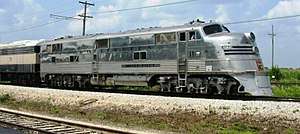EMD E5
The EMD E5 is a 2,000-horsepower (1,500 kW), A1A-A1A passenger train-hauling diesel locomotive manufactured by Electro-Motive Corporation, and its corporate successor, General Motors' Electro-Motive Division (EMD) of La Grange, Illinois, and produced exclusively for the Chicago, Burlington and Quincy Railroad (“The Burlington Route”), and its subsidiaries, during 1940 and 1941. The E5 was distinguished from the otherwise very similar E3, E4 and E6 by being clad in polished stainless steel to match the Burlington's Zephyr trains. It also featured unique small grill-like ornamentation on both sides of the upper headlight. Like the other models in the E-series, the E5 had a sloping “slant nose” and it was equipped with two headlights — a regular stationary headlight above a gyrating "Mars" signal light. The E5 was the sixth in the EMD E-unit series.
| EMD E5 | |||||||||||||||||||||||||||||
|---|---|---|---|---|---|---|---|---|---|---|---|---|---|---|---|---|---|---|---|---|---|---|---|---|---|---|---|---|---|
 CB&Q EMD E5 No. 9911A Silver Pilot at the Illinois Railway Museum | |||||||||||||||||||||||||||||
| |||||||||||||||||||||||||||||
| |||||||||||||||||||||||||||||
| |||||||||||||||||||||||||||||
| |||||||||||||||||||||||||||||
Engine and powertrain
The E5 used twin 12 cylinder 567 engines developing a total of 2,000 hp (1,500 kW) at 800 rpm. Designed specifically for railroad locomotives, this supercharged 2 stroke 45 degree V type, with an 8 1⁄2 in (216 mm) bore by 10 in (254 mm) stroke giving 567 cubic inches (9,290 cm3; 9.29 L) displacement per cylinder, remained in production until 1966. Two D.C. generators, one per engine, provide power to four motors, two on each truck, in an A1A-A1A arrangement. This truck design was used on all E units and on MP 7100 AA6, CB&Q 9908, and C,RI&P AB6 power cars. EMC/EMD has built all of its major components since 1939.[1][2]
Original owners
| Railroad | Cab-equipped A units | Cabless booster B units | Road numbers A units | Road numbers B units | Notes |
|---|---|---|---|---|---|
| Chicago, Burlington and Quincy Railroad | 9909, 9913, 9914A,B, 9915A,B | ||||
| Colorado and Southern Railway | |||||
| Fort Worth and Denver Railway | |||||
| Total | 11 | 5 | |||
Locomotive names
| Name | Cab/Booster | #(as built) |
|---|---|---|
| Silver Bullet | (cab) | 9909 |
| Silver Speed | (cab) | 9910A |
| Silver Power | (booster) | 9910B |
| Silver Pilot | (cab) | 9911A |
| Silver Mate | (booster) | 9911B |
| Silver Meteor | (cab) | 9912A |
| Silver Comet | (booster) | 9912B |
| Silver Wings | (cab) | 9913 |
| Silver Arrow | (cab) | 9914A |
| Silver Swift | (cab) | 9914B |
| Silver Carrier | (cab) | 9915A |
| Silver Clipper | (cab) | 9915B |
| Silver Racer | (cab) | 9950A (C&S) |
| Silver Steed | (booster) | 9950B (C&S) |
| Silver Chief | (cab) | 9980A (FW&D) |
| Silver Warrior | (booster) | 9980B (FW&D) |
Surviving example
Only one E5 unit of the original 16 built survives today. The last surviving EMD E5 diesel, CB&Q No. 9911A Silver Pilot, is owned and operated by the Illinois Railway Museum in Union, Illinois. Last used on the Fort Worth and Denver Railway (a CB&Q subsidiary) on the Texas Zephyr, the E5 is matched with one of the Burlington's Nebraska Zephyrs, a 5 car, articulated, stainless steel 1936 passenger train. This equipment was used in the production of the 1992 film A League of Their Own, and for the 2006 film Flags of Our Fathers, E5 9911A Silver Pilot was used with 4 stainless steel passenger cars relettered to resemble the Zephyr trainset.
See also
References
Notes
- Pinkepank 1973, pp. 13, 26, 106, 121-122.
- Ross 2003, pp. 273-274.
Bibliography
- Lamb, J. Parker (2007). Evolution of the American Diesel Locomotive. Railroads Past and Present. Bloomington, Indiana: Indiana University Press. ISBN 978-0-253-34863-0.
- Marre, Louis A. (1995). Diesel Locomotives: The First 50 Years: A Guide to Diesels Built Before 1972. Railroad Reference Series. Waukesha, Wisconsin: Kalmbach Publishing. ISBN 978-0-89024-258-2.
- Pinkepank, Jerry A. (1973). The Second Diesel Spotter's Guide. Milwaukee, Wisconsin: Kalmbach Publishing. pp. EMD–121–123. ISBN 978-0-89024-026-7.
- Schafer, Mike (1998). Vintage Diesel Locomotives. Enthusiast Color Series. Osceola, Wisconsin: MBI Publishing. ISBN 978-0-7603-0507-2.
- Solomon, Brian (2000). The American Diesel Locomotive. Osceola, Wisconsin: MBI Publishing Company. ISBN 978-0-7603-0666-6.
- Solomon, Brian (2006). EMD Locomotives. St. Paul, Minnesota: Voyageur Press. ISBN 978-0-7603-2396-0.
- Solomon, Brian (2010). Vintage Diesel Power. Minneapolis, Minnesota: MBI Publishing. ISBN 978-0-7603-3795-0.
- Solomon, Brian (2011). Electro-Motive E-Units and F-Units: The Illustrated History of North America's Favorite Locomotives. Minneapolis, Minnesota: Voyageur Press. ISBN 978-0-7603-4007-3.
- Solomon, Brian (2012). North American Locomotives: A Railroad-by-Railroad Photohistory. Minneapolis, Minnesota: Voyageur Press. ISBN 978-0-7603-4370-8.
- Wilson, Jeff (2002). E Units: Electro-Motive's Classic Streamliners. Classic Trains / Golden Years of Railroading series. Waukesha, WI, USA: Kalmbach Publishing. ISBN 0890246068.
External links
| Wikimedia Commons has media related to EMD E5 locomotives. |